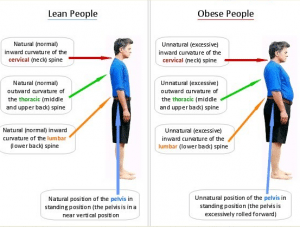Most of us already know that being overweight can contribute to a wide variety of health problems. Many people also realise that being overweight puts additional strain on the body – the typical example is the knees. What’s less known is the effect that being overweight can have on the spine!
While there are a multitude of excellent reasons to get in shape, you might also like to know that doing so can go a long way to prevent and reduce back pain. If you need to shed a few pounds, read on to learn about fascinating research, which is inspiring many patients to watch what they eat and exercise regularly.
The Spinal Link
The link between spinal health and being overweight isn’t always Widely discussed, but it should be since every one of the factors l inking obesity with back pain is also a risk factor for a common spinal problem. This condition is called vertebral subluxation, which leads to the creation of areas in the spine where movement is restricted or spinal bones (vertebrae) are slightly out of place. Doctors of chiropractic are experts in correcting vertebral subluxations, and as a starting point beginning a regime of chiropractic care is an excellent way to quickly reduce back pain – however going forward there’s a lot you can do yourself to augment your care, making your pain reduction much faster.
An important point
We tend to use the word “weight” rather unthinking when talking about our bodies – what we are really talking about here is excess body fat, rather than muscle, which weighs more and of course should help to support the spine. Indeed, recent research seems to indicate that not all weight gain is linked with a bolstered risk of back pain – According to a new study, only fat gain triggers back pain. On the other hand, gain of lean body tissue, such as muscle does not appear to heighten the risk.[1]
However, when training to add muscle you should bear the following points in mind too – poor posture or underlying imbalances can mean that additional weight of muscle can also stress the spine! This problem is easily avoided by regular chiropractic and postural checks, which are especially valuable for anyone involved in intensive training.
That being said, research also suggests that lower back pain specifically is less strongly correlated – meaning that increasing weight of any sort might predispose you to lower back pain.[2] Instead, lower back pain is more likely to be a symptom of our everyday lives and, thankfully, is something we help literally hundreds of clients overcome each year.
How being overweight affects the spine
So lets take a look at how being overweight actually affects the spine – by reducing these problems, we can directly improve our spinal health.
Mechanical Stresses
When chiropractors talk about mechanical stress, we mean the stress imposed on your body by the forces acting upon it. Its easy to forget that while you might be sitting comfortably, your spine is still working to support the weight of your body in the position you have assumed, as well as against gravity!
Excessive fat tends to throw off the natural balance of the body – simply put the extra weight “pulls” the spine away from its optimal position. This is especially true of abdominal fat, which pulls the curve of the lower back forward . This imbalance forces the spine and surrounding muscles to take on additional work, for which they were not designed.
At the same time, extra weight subjects the spine to direct pressure, which can result in spinal degeneration, joint problems and muscle fatigue over the longer term. Obesity also ups the risk of developing a herniated spinal disc and related nerve problems.
Lack of Exercise
Statistically speaking, overweight people are more likely to be sedentary, compared with their more lean counterparts. Scientific studies show that regular exercise plays a valuable role in preventing back pain, and that a lack of exercise can also up your risk of back pain. As mentioned above however, exercise itself can lead to pain, especially if you have pre-existing factors, such as poor posture, which can put additional stress on the spine when exercising. Thankfully, these kinds of issues are simply and easily identified and corrected at our clinic. If you’re thinking of starting an exercise routine, or you’ve been out of the game for a while, why not stop in for a check out before hand and head off back pain before it develops!
Emotional Stress
Research suggests that people who are overweight or obese have a higher risk of emotional stress and depression – in turn research links depression with an elevated risk of back pain.
Why is obesity associated with depression? In part its likely to be because overweight people are more likely to lack exercise, compared with fit individuals. Hormones released during exercise are a significant contributor to emotional wellbeing . In fact, studies indicate that regular aerobic exercise is as effective – if not more effective than antidepressant medication.[3]
Along with lack of exercise, negative self-image, social withdrawal and feelings of hopelessness are other factors explaining why obesity may instigate depression. Finally, surplus fat may also trigger chemical changes in the body, which may spark depression .
Sleep Problems
Studies demonstrate that obese people are more l likely to suffer sleep disorders, including sleep apnoea. Research shows that lack of sleep or poor sleep quality bolsters an individual ‘s odds of developing back pain.
Inflammation
The latest scientific inquiries on obesity are revealing that excess weight produces widespread inflammation in the body. Specifically, studies in mice show that obesity causes a “master switch” to be turned on in the hypothalamus area of the brain.
Th is “master switch,” which is usually turned off in healthy people, causes chemical changes that spark inflammation throughout the body. This, in turn, ups the risk of a myriad of health disorders, including back pain[4] .
Assessing Your Risk
The simplest way to assess your likelihood of being overweight or obese is to calculate your body mass index (BMI). Th is measure, which is commonly used by health-care practitioners, is a mathematical formula that takes into consideration an individual’s height and weight.
BMI indicates the amount of fat in a person’s body. The higher a person’s BMI falls on a predetermined range of values, the higher his or her likelihood of obesity BMI is however, only a quick reference, as it does not take into account the true percentage of fat vs. muscle in your body. BMI is also based on an “averaged” individual – meaning if you are much taller or shorter than average, your scores will be inaccurate. Bodybuilders and basketball players tend to come out as “obese” on a BMI chart!
The formula for BMI is simply weight in kilograms divided by height in meters squared (kg/m2). You can find many calculators online including one here
We Can Help!
At compete chiropractic we’re committed to helping our patients improve every aspect of their lives. That means supporting patients to achieve wellness through regular chiropractic care, but also through stress reduction techniques such as massage and through providing exercise and nutrition advice. This also entails encouraging patients to achieve and maintain a healthy weight and fitness level.
If you need guidance shedding extra pounds, or with talking back pain please just get in touch!
[1] Spine 201 1;36:I 320-5
[2] Spine 201 1 ;36:1320-5
[3] Psychosom Med 2000;62:633-8
[4] Cel/ 2008 ;135:61-73

